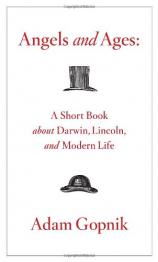Angels and Ages: A Short Book About Darwin, Lincoln and Modern Life
Review
Angels and Ages: A Short Book About Darwin, Lincoln and Modern Life
These days the air is thick with talk of Abraham Lincoln. From
the fascination with his “team of rivals” to the
political roots in Springfield, Illinois, he shares with our new
president, it seems everyone wants to grab a seat in
Lincoln’s rail car.
Charles Darwin has had his own recent stint in the limelight. In
2005, in my hometown of Harrisburg, Pennsylvania, a conservative
Republican federal judge patiently listened to seven weeks of
testimony in a challenge to a small town school board's attempt to
mandate the teaching of “intelligent design” --- a
fundamentalist antidote to Darwin’s theory of natural
selection --- before issuing a blistering opinion rejecting it as a
violation of the First Amendment.
Born on the same day --- February 12, 1809 --- one in a cramped
Kentucky log cabin and the other in comfortable circumstances in
England, the subjects of The New Yorker’s Adam
Gopnik’s intellectually stimulating appreciation might appear
to be an odd couple. But like a contemporary Plutarch, Gopnik has
linked these monumental historical figures on the intriguing theory
that they form “two pillars of the society we live in: one
representing liberal democracy, the other the human
sciences….” And while that connection is far from
obvious, by the end of a work in which he marries analytical rigor
to his customary elegant prose, he has made a persuasive case that
the two merit this unique joint recognition.
Originally published as two pieces in The New Yorker,
ANGELS AND AGES consists of four chapters alternating between
Lincoln and Darwin, bracketed by opening and concluding essays in
which Gopnik considers his subjects together. The book takes its
title from the debate that has raged over the words uttered by
Secretary of War Edwin Stanton at the moment of Lincoln’s
passing: Did the assassinated president belong to the
“angels” or the “ages?” For Gopnik, that
mystery triggers a searching inquiry into the influence of his
subjects on the birth of modern liberal thought, as Western
civilization, spurred by their work, underwent a decisive shift
from a vertical worldview, eyes cast heavenward in reliance upon
the divine, to one that came to grips with mankind’s place in
the vast forward movement of history.
Gopnik is most captivated by Lincoln and Darwin’s skill as
writers, their facility with the written word forming the core of
his thesis that “literary eloquence is essential to liberal
civilization; our heroes should be men and women possessed by the
urgency of utterance, obsessed by the need to see for themselves
and to speak for us all.” To support it, he marshals an
impressive body of evidence in a work that in the best sense seems
intended, not to end a debate, but to spark one.
In the case of Lincoln, “a great writer whose form was
talking,” Gopnik argues that the
lawyer-turned-politician’s “rhetorical genius lay in
making cold calculation look like passionate idealism, in making
closely reasoned argument ring with the sound of religious
necessity.” Darwin, who Gopnik describes as a “natural
novelist,” brought us a new way of seeing, “to remind
us of the role of good old-fashioned observation in science.”
He displayed that gift long before the publication of ON THE ORIGIN
OF SPECIES in 1859, a work he produced more than 20 years after
formulating the theory of natural selection, the delay arising, in
part, from his reluctance to expound a construct that would be at
odds with his wife’s strong religious convictions.
For although Lincoln and Darwin were public men, both displayed
an intense attachment to family life, and both, Gopnik points out,
were profoundly affected by the loss of a young child. As to each,
he musters a spirited defense against charges of racism --- Lincoln
because of the claim of some that his determination to end slavery
did not extend to the notion of equality for its victims, and
Darwin arising from the way his theories have been distorted in
order to hijack them into the service of political agendas that
would have been alien to him.
In the moving final pages of his book, Gopnik asks us to
consider no less a subject than how the ideas to which Darwin and
Lincoln gave such eloquent voice have shaped our notion of what it
means to be human. “They found a way to sustain the necessary
values of the Enlightenment,” Gopnik concludes, “in the
face of pessimistic truths about the universe and political
conduct.” Though they operated in the disparate realms of
politics and science, both of these extraordinary men made us see
the world in new ways, and, through that insight, helped usher in a
new world.
Reviewed by Harvey Freedenberg (mwn52@aol.com) on December 22, 2010
Angels and Ages: A Short Book About Darwin, Lincoln and Modern Life
- Publication Date: January 27, 2009
- Genres: Biography, Nonfiction
- Hardcover: 224 pages
- Publisher: Knopf
- ISBN-10: 0307270785
- ISBN-13: 9780307270788





